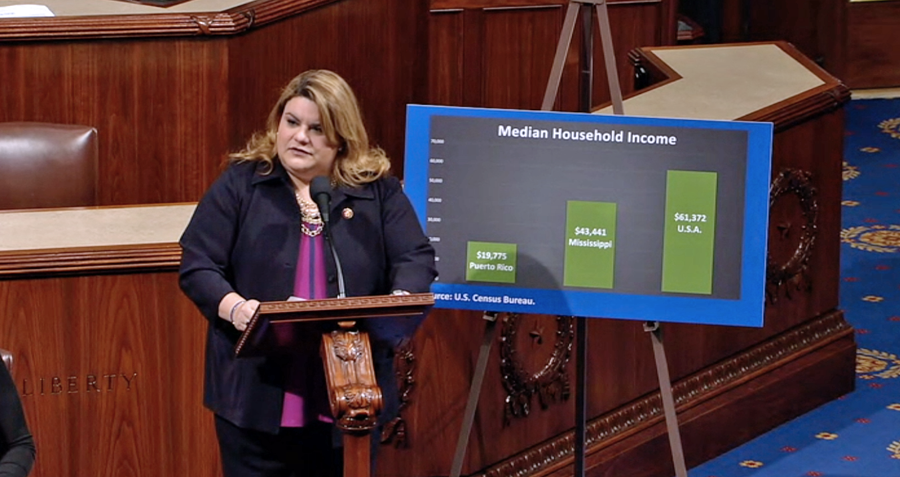Senator files bill to develop P.R.’s ‘sharing economy’ sector


From left: Manuel Laboy and Zoé Laboy-Alvarado.
In response to the growing trend of businesses under the “sharing economy” model, Sen. Zoé Laboy-Alvarado, presented Senate Bill 840 to ensure the design and implementation of public policy that promotes the sector’s growth on the island.
“Collaborative” or “sharing economy” refers to the business model in which consumers rent goods and services between them. This model covers all types of shared or exchanged goods and services, for both monetary and non-monetary benefits.
The collaborative economy covers a range of sectors and industries, such as housing, food consumption, transportation, retail, consumer goods, media and entertainment, among others.
Examples of businesses operate successfully under this model are Airbnb, Homeaway, Feastly, Uber, Lyft, Sidecar, Tradesy, NeighborGoods, Wix Earbits, Spotify and SoundCloud.
“The exchange of goods and services among consumers is not new, but the prevalence of the internet and e-commerce has led to the creation of hundreds of online platforms that facilitate and process these exchanges,” Laboy said during a news conference.
“However, despite the great potential of the collaborative economy, government regulation could become one of the main stumbling blocks of this new economic model in Puerto Rico,” she said, adding that often, regulatory changes do not occur on a par with the times, or occur in a disjointed manner.
This happens partly because agencies are not necessarily focused on economic development and new businesses. Because the collaborative economy model works in different industries, a coherent public policy to facilitate the development and growth of these companies is necessary, she added.
The bill proposes the creation of uniform public policy and regulations related to sharing economy-related companies and service providers under the responsibility of the Economic Development and Commerce Department, in collaboration with various government.
This would include, but is not limited to the creation of an Interagency Committee for Development of Collaborative Economics; to disseminate all regulations needed for the implementation, operation and protection of companies dedicated to the collaborative economy; as well as outline, analyze and establish the requirements for licensing, permits, concessions and accreditation of participating companies and providers.
During the press conference to announce the introduction of the measure, Economic Development and Commerce Secretary Manuel A. Laboy — who has supported the bill since its inception — said while the sharing economy sector has grown exponentially in recent years, there are still few companies in Puerto Rico participating.
“Our job is to ensure that the ease and flexibility that this technology allows is more accessible to more Puerto Ricans, giving cheaper economic opportunities to the owners of an asset,” he said.
“As an initiative of the Plan for Puerto Rico, we have been involved in the discussion from the outset to establish a clear regulatory framework that allows a conducive and attractive environment for the establishment of more companies in this emerging industry in Puerto Rico and to follow the path to create more and better jobs for our people,” he said.
Although estimates vary, recently PricewaterhouseCoopers, a consulting and other professional services firm, estimated that by 2025 the collaborative economy could represent $335 billion in global revenue annually.
That said, Laboy that priority should be given to options such as the collaborative economy as part of the plan to lift the island’s economy.
“It is time to promote a robust dynamic economy and an environment of innovation in Puerto Rico,” the at-large Senator said.














Barter exchange is the oldest economic system in this world! In the age of consumerism, most depend on jobs to provide cash to buy, but renting is a major component and it is a form of barter exchange that requires only paper currency. The fact in PR is that about 40% of residents survive without payroll jobs! They do odd jobs and services in exchange for something of exchangeable value and make the trade be fair with cash for the difference. This means of survival is growing as the 40% working for government must disappear along with $70 billion of debt and cost of unfunded pensions!
It will take a new nation to replace the bankrupt one. The Court will liquidate its poultry assets to the foolish creditors. A new Associated Free State will emerge! Oddly it will have the same name as the one in place in Spanish- Estado Libre y Asociado. The word Commonwealth as meaningful as Mr. in English will be replace by Free Associated State of PR. It will be independent but associated and for a few decades receive ‘Alimony’ from its former dominant political marital partner that includes dual citizenship to enable many more who prefer a payroll consumer economy to relocate to the mainland of the U.S. or its other remote states and possessions.
Look for the shared economy to expand to include local food production in exchange for items relating to housing, energy, access to roads, etc.